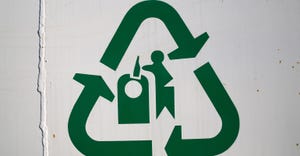August 1, 1996
Ann Lucius
Truckers in other markets may say the waste industry's got it easy, because hauling companies actually can make money by transporting air. What they forget, however, is that the converse is true, too.
The fuller the container, the less profit is made, depending on how much is charged to tip at a disposal site. And in some cases, if the cost of tipping is high and the container is heavy, the hauler will lose money.
Indeed, truth can be stranger than fiction when companies charge a flat rate instead of per pound for container services.
This is one reason why many haulers balk at charging by the pound, explained Al Bowman of Mobile Computing, Ontario, Canada. To appease weight-based customers demanding a fairer pricing structure, many companies that are turning to truck scales to balance the field are discovering that scales can add dollars to their bottom lines as well.
Dwayne Riley, operations manager for York Waste Disposal Inc., York, Pa., purchased three Mobile scales last year for four of the company's 20 front-loader trucks.
At $10,000 a pop, Riley said he believes the scales "have more than paid for themselves - three or four times over."
He said that companies in the market for scales should ask about customer service and maintenance. For example, he said his employees received step-by-step training in calibrating and servicing the scales. The scales' calibration must be checked about once a week, but should be monitored constantly for fluctuations, especially during temperature changes, Riley said.
At D&K Refuse, Becker, Minn., two of the company's four rear-loaders have Vulcan on-board scales. The company bought its first scale three years ago for $4,800 and purchased the second one the following year for $5,600.
"Our dumping bill was larger than our intake bill," said Randy Linn, operations manager. D&K purchased truck scales after Linn crunched the numbers on D&K's largest clients and discovered that they were being undercharged.
The next hurdle Linn faced was explaining the post-scale cost increase to the affected customers. "I had the customer hop on the scale to let them see how it worked," Linn explained. "It was almost mandatory for those we had to give substantial increases to."
In Minnesota, scales must be set to half-pound increments in order for users to charge by weight. Due to this law, said Linn, their scales are not set up to charge that way. "They're not that precise," he explained, "so we're flexible." Linn said their commercial customers are charged based on their average monthly rate, but the weighing process is not done on the residential side.
Another Minnesota company, A.W. Disposal, Glencoe, has three front-loader and two rear-loader trucks that have Vulcan and SBI scales, four of which were purchased four years ago for about $6,000 with scales installed, said shop manager Marlen Harris.
With residential and commercial customers being charged by weight, Harris said the scales have been a cost savings to AW - like D&K, they, too, had been undercharging some customers.
Ken Vanbyssum, director of safety for Arc Disposal Co., Mount Prospect, Ill., and a potential truck scale buyer, said he is "looking at cost, simplicity of use and the ability to download into a computer."
Right now, the company has no need for scales on its 100-plus rear-loader, front-loader, side-loader and roll-off trucks because it charges by the yard. Charging by weight is a strong future possibility, however, in which case scales "have advantages," said Vanbyssum,
Companies should take its needs as well as those of the customer into consideration when selecting a scale system. Rick Talbot of Stress-Tek/Vulcan, Kent, Wash., said there are certain factors that affect the application of on-board scales, such as increasing overweight enforcement due to road repair and safety.
"Increasing tipping fees, operating and transportation costs will require operators to know the true cost of a service, while increasing competitive environments require more knowledge of the customers and the appropriate level of service necessary," he said.
Ed Vogel Jr., vice president and general manager of Tri-County Industries/Vogel Disposal, Grove City, Pa., said he believes on-board is the way to go. Last fall, his company purchased two Wray-Tech on-boards that they use on front-loader, commercial routes.
The scales were necessary, he said, because the company pays by the ton to dump. The older models it initially used got to be "too labor intensive," so an update became necessary.
The money paid for the scales and software were worth the price, Vogel said, because "they definitely in-creased production."
Saying on-boards are a "good audit on a route," he said they "tie in everything" such as when a driver starts a truck, when he arrives at a container and how much time he spends at a site.
Weighing The Future "On-board systems are getting more complex," said Mobile Com-puting's Bowman whose company may begin offering dynamic routing software. Dynamic routing will give each truck's status - location and capacity - in order to allow a partially-filled truck to continue the route.
Stationary scale manufacturer Fairbanks, Kansas City, Mo., introduced Intalynx last year. Fairbank's Derrick Mashaney said this product allows the user to contact the individual scale via modem and diagnostics to identify problems before they occur.
Bruce Reierson, of Mettler-Toledo, Columbus, Ohio, foresees more digital technology in the future for stationary scales. He said Europe is experimenting with this technology, but it is not used widely in the United States yet - a problem he attributes to transient vehicles.
While common users of the landfill or transfer station will be in the database, one-time or occasional users will have to be entered into the database individually. "The desire is to be able to do everything automatically," Reierson said.
Since Mobile has many clients in Europe, where it is illegal to use uncertified scales, its commercial truck scales are certified to charge by the pound.
Reierson predicted that in five years, most scales in the United States will be certified, regardless of whether or not they are used for charging by weight.
David Wray, vice president of marketing for Wray-Tech Instruments, Stratford, Conn., said his company has patented a control valve for commercial front-loaders that weighs dynamically, with little delay and a 1 percent accuracy.
Equipment in general, he said, is "ten times more reliable" than it was eight years ago, when his company began.
However, Wray said, "We should be booming along. None of us are. We have to wake up and realize that revenues won't stay [where they are]." He anticipates a switch when every business begins charging by weight.
Wray said Europeans have a better approach: They have a 3-percent weights-and-measures structure.
Weigh-in-motion front-fork scales for commercial accounts eventually will provide improved pick-up weight accuracy without delay, and there will be weigh-in-motion scale systems for cart tippers on residential routes, said Stress-Tek/Vulcan's Talbot.
Although Talbot said the future will spur more interest in certified weight programs, implementation will be hindered by the higher costs.
Tom Kendall of Precision Loads in Seattle has developed on-board scales for front-loaders, but so far, they are only used in Germany and England, where they are approved by weights and measures. He expects U.S. approval in the next six months.
A front loader system that weighs both individually and by axle is being developed by Weigh-Right, South Hutchinson, Kan.
In the future, "you're going to want to be able to tell everyone what they picked up within two pounds," predicted Weigh-Right's Dave Dohrmann.
Like his counterparts, Dohrmann sees the industry developing quickly. "Scales are a lot smarter," he concluded.
You May Also Like


